This is the start of my review on the Honda NX500 which I will regularly
update.
On the 7th November 2023, I changed the deposit on a Honda CB500X
motorcycle to the brand new Honda NX500 Adventure Crossover motorcycle
for an early delivery in April 2024. I chose the white colour variant.
I collected my Honda NX500 on the 7th March as I was informed by the
Honda Dealership that it was legal to ride it in the UK. I was fair
chuffed riding a 2024 plate on the road before April.
Although the motorcycle is branded as the Honda NX500, its official name
for registration and insurance purposes is the Honda CB500 XA-R.
You can read the entire review by starting at
Why the NX500 over the CB500X
or select an area of interest in the contents - some sections will contain duplicate information.
Contents
-
Oxford Stormseal Waterproof Rain Suit (Negatives & Conclusion)
-
2025 - 2nd Service
Why the NX500 over the CB500X -
-
The addition of the Honda Selectable Torque Control
-
The Colour TFT Dash Screen
-
The slightly lighter 196Kg Wet Weight
-
Lighter 5 Spoke Wheels
-
LEDs all round
-
The improved Headlamp
-
The improved Visual Look
Reasons for the Purchase
First and foremost it is a birthday present to myself as I celebrate my
75 years on planet earth. Also,
I alternate my summer rides on my two sports motorcycles but I never
take them on the rough country B roads of Scotland. These type of roads
are just thin lines on a map, especially the ones that are just tracks
over the mountain ranges. These are the types of roads I want to explore
and as a keen photographer, to capture some landscape images. Of course,
stopping for a very nice picnic, high up a hillside is also very
appealing - nothing like a nice sandwich whilst chilling out and taking
in the views. In the summer months, I will alternate the NX500 with my
sports bikes - when I feel the need for speed. Scotland is notorious for
wet weather and the month of July (2023) experienced rain most days.
The Honda NX500 is the ideal bike to take out when there are
intermittent showers. I have Gore-Tex clothing, so no soaking wet
worries and the bike has traction control.
Every
winter my two sports bikes are stored in the garage and connected to
Optimate chargers. I hate the winter period in Scotland and travelling
in my car to visit my family and friends on the dual carriageway is a
pain in the neck. I usually end up sitting in long traffic queues.
The Honda NX500 is a motorbike that I will use in the winter
months when the weather is reasonable, even when there is rain about but
not on snow and icy roads. It is ideal for lane splitting and
fortunately the NX500 does have traction
control which is an added safety bonus.
All the Honda NX500 requires is some
preparation with
Muc-Off Motorcycle Protectant
protection spray which I have found is better to apply and attracts less
sticky dirt than
ACF-50.
Then it a decent wash down after every trip before it goes
into the garage.
Even on sunny dry days in Scotland in the winter, there is plenty of
residual salt dust flying about on the roads, especially the dual
carriageways, so a good wash cleans away the salt, especially from the
braking system.
I have been watching the recent video reviews on the Royal Enfield Classic 350
and the ongoing analysis of 'Weight to Power' ratio of 350cc motorcycles. I test
rode the Royal Enfield Hunter 350 and it was a nice bike for my 2024 plan of
rambling on the country lanes but not one that promoted safety on the very fast
Edinburgh City Bypass; my main route to and from the country lanes of the
Lothian and Borders of Scotland.
These days, a motorcycle does not have to be a full on fast sports bike but it
should have enough poke and braking power to get you out of trouble: safely
overtake those crawlers in the inside lane and yet staying ahead of the fast
moving herd in the outside lane, brake efficiently in wet weather at dual
carriageway speeds and have enough weight to remain firmly planted on the road,
especially a soaking wet road at 70mph.
Hence, my 2024
Honda NX500 Adventure
Crossover Motorcycle,
which weighs in
at 196Kg wet and the bike is in that sweet spot
between those lightweight single pot 373cc motorcycles and the larger, heavier
and higher seating positions of those 650cc, and above, adventure motorbikes. The
parallel twin liquid cooled 471cc engine, the front twin ABS disc brakes, Showa 41mm SFF-BP front forks suspension, 830mm seat height and 180mm ground clearance have a lot to
offer. It has more than enough poke for fast overtaking on the dual
carriageways, excellent braking capability and more than capable of handling the
narrow rough trail roads of
Scotland. The icing on the cake has to be the introduction of the Honda Selectable
Torque Control that can be switched off when required.
My Choice of Accessories:
-
Honda Crash Bar Set, Spot Lights, Smoked Windscreen, Red Wheel Stripes, Knuckle Guards & Tankpad
-
Honda Centre Stand, Deflector Kit & 12v Socket
-
Honda Heated Grips
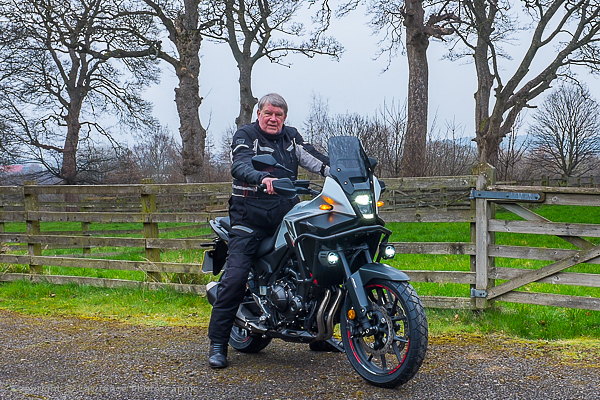
Me on my New Bike
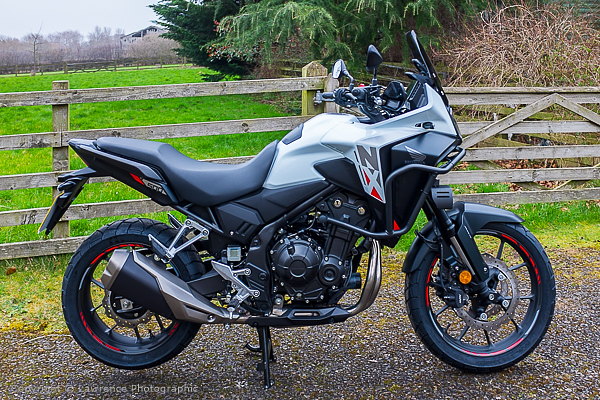
My Bike on the Centre Stand
R&G Tank Grips
I have fitted R&G Tank Traction Grips to my Honda NX500 which will provide me with more grip on the tank and prevent my knees from sliding -
Scottoiler Electronic System
My existing sports motorcycles have a Scottoiler fitted, so I have
fitted an electronic
Scottoiler X System
to my Honda NX500 to continually oil the chain when I am out and about
on the bike.
I plan to use the Honda NX500 all the year round and alternate it with
my sports bikes in the summer. However, for storage in the garage, and
for additional charging top ups, an Optimate flying lead is attached to
my Honda's battery for connecting to my
Optimate 4 Automatic Battery Charger.
You can see the Optimate flying lead, in the image below, clipped to the
rear foot peg.
An image of my Scottoiler X followed by a video of how it works -
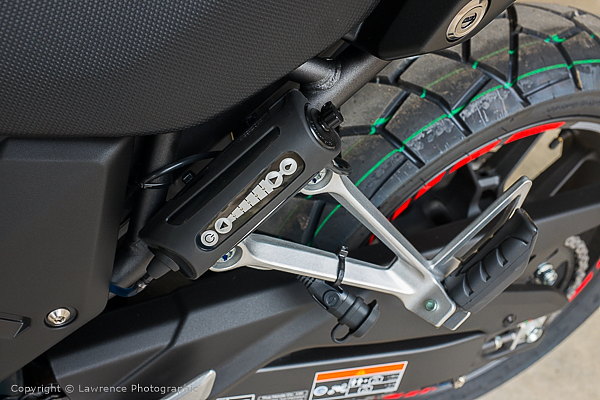
Armoured
Protection & Klim Airbag System
The other day I measured all
my motorbike jackets using the
In&Motion Sizing Tutorial video and was pleasantly surprised to
find that there was
enough
room in all of them (even wearing my thermals inside my Rev'It Gore-Tex
Touring/Adventure jacket) to fit a
Klim Ai-1 Rally Airbag, with Level 2 D30
back protector and Level 1 D30 Chest Protector. I can even wear my backpack
provided I allow room (10cm/4 inches) between the shoulder straps and my body. In the UK,
Sportsbikeshop supply a Klim Ai-1 Rally
Airbag with the In&Box Control Module included in the price. You then download
My In&Box App to your Smartphone and register your control
module and membership rental plan. The default mode supplied with the control
module is Street Mode and you can also add Track and/or Adventure for an
additional monthly rental cost.
If the airbag is inflated due to a spill, you
can purchase a new In&Motion Inflator Canister to easily replace the used one in
the airbag. And, provided the airbag is not damaged, it can sustain 3 inflations
before it has to be sent back to
In&Motion for
checking before it can be used again. Full information at
In&Motion Tutorials which includes My In&Box
Activation video as shown below. Scroll down the In&Motion Tutorials Page to the
'How Can we Help You' question and answer section for more advice.
The Klim Ai-1 Rally variant has superior chest and back protection to the
Standard Klim Ai-1 one. I am seriously
considering the purchase of a Klim Ai-1 Rally Airbag as soon as it becomes
available again. Apparently it is in short supply and it is rumoured that it may
be upgraded to include shoulder protection - hence the delay.
Over here in Scotland during March and
April (2024) we have, and still are, experiencing terrible weather.
Storm winds, heavy rain and periods of extreme cold, especially when
riding a motorbike. My Honda NX500 adventure motorcycle has proved to
be an excellent choice
and thanks to the weather I have been able to fully develop new clothing
for this year's late Autumn and Winter periods.
My
fully
sleeved
base layer, 10 year old Rev'It
Gore-Tex touring jacket and Rev'It Gore-Tex trousers with their thermal
layer and heavy Richa Gore-Tex gloves kept me dry but even with my Honda
NX500 motorcycle's heated grips warming my palms, the back of my hands
were freezing. Worse still, after a few miles on the dual carriageway,
the areas under my arms were also freezing. My new
Oxford Advanced Storm Collar did a
great job of keeping the rain and cold of my neck and my Alpinestars
boots were fully waterproof and cold proof thanks to my thermal
socks.
In an effort to combat the cold, I put on my skin tight fully sleeved
base layer, and then a fully sleeved M&S Marino Wool thermal vest. To
top of the two layers,
I purchased an
Oxford Advanced Expedition MS Midlayer
which was a tight slim fit and when zipped up, it pulled the layers
tight in against my body. On went the Rev'It Gore-Tex jacket and Rev'It
Gore-Tex trousers with their thermal layers, my Alpinestars boots, my Oxford Advanced Storm Collar
and I
also purchased from
Edinburgh Saltire Motorcycles a pair of
Rev'It Fusion 3 Gloves which are
Gore-Tex winter gloves specifically designed for wearing with heated grips.
My palm measurement was 10" which states on the Rev'It website that a 3XL is the
correct glove size. Having previous experience with Rev'It glove measurements, I
went for the 4XL and the gloves are a comfortable fit, but with just a little
bit more material beyond the tips of my fingers - the price for having broad
palms and short fingers.
Finally, the cold was kept at bay, and the summer weather (hopefully)
will soon be here but next winter I will be out and about on my Honda
NX500 wearing my new clothing to combat the worst of the Scottish
weather.
Summer Clothing
With Scotland's continual rain, right into June 2024,
I
have continued to wear my Rev'It Touring/Adventure Gore-tex jacket
and trousers when out and about on my bikes. However, although my Rev'It
Fusion 3 Gore-Tex gloves proved excellent (earlier in the year) during
that torrential cold rain spell, they proved too hot for the summer,
even when it was raining. Once again, I dipped into my reserves and
purchased from
Edinburgh Two Wheels, a
fantastic pair of short Klim Adventure Leather Gloves (3xl size) in
black. They have a Gore-Tex inner membrane but I did not feel it on my
fingers and it made no attempt to come out with my fingers when I
removed the gloves.
Eventually, I hope to get back into my summer Rev'It leather jacket and jeans, or my
lightweight, bomber style, Rev'It Gore-Tex textile jacket
and Rev'It textile trousers. And for those days of torrential summer
rain I have supplemented my backpack with an
Oxford Stormseal Waterproof Rain Suit.
Oxford Stormseal Waterproof Rain Suit (Negatives & Conclusion)
No matter what size of
Oxford Stormseal Waterproof Rain Suit
you purchase,
it
will not be a perfect fit unless your entire body is in perfect
proportions. To add grist to the mill, the rain suit has to fit over
your existing armoured clothing which differs in thicknesses, depending
on the style and the Brand Name. To make matters worse, most purchases
have to be made on-line without the ability to try a suit on for size.
When riding my sports bikes, I wear a very heavy leather jacket and
Kevlar jeans or a Rev 'It textile jacket and Rev'It textile trousers
during the summer months which differ in thickness. When about and about
on my Honda NX500 adventure bike I usually wear my Rev'It Gore-Tex
clothing so the rain suit is not usually required although I carry it in
my back pack for those long periods of extended and torrential rain in
Scotland.
I am
6' tall with broad shoulders, 44" chest, 37" waist, 32" inside
leg size,
a long back and an 18.6" neck. I guess I am a bit of a freak size. If my legs
were in proportion to my body, I would be about 6 feet, two inches tall
and my neck in proportion to a 38" chest, would be about 17". I
found the 3XL the best fitting over my leather jacket and jeans but I
will cover the negatives which for me are not deal breakers.
-
There was a small piece of clear plastic sealant tape halfway up the inside of the (left) zip which was part of the suit but badly manufactured and partially stuck over the zip, preventing it from zipping up - I snipped it off the zip contact area with pair of scissors - no damage to the suit.
-
Halfway up the suit at the main zip there is a fold of black coloured cloth (inside) which you have to carefully navigate the zip around, lest the zip becomes stuck and extremely difficult to unzip to release.
-
At my 6' height, wearing a 3XL size the hood just clears over and covers my helmet but my 18.6" neck makes it difficult for me to fasten the suit at the neck with the hood in use. However, the hood can be folded away and stored in a pouch at the back of the neckline.
-
The two waist velcro strap adjusters have very little draw in positions and the suit when fully drawn in at the waist remained like an inflated bag. I looked like a giant panda.
You have to carefully wiggle your boots through the suit legs as they tend to stick to the inside of the suit.
The suit was slightly longer than my legs with my boots on but the suit leg straps with their velcro fixings kept the suit from dragging on the ground.
A bag is not provided in the purchase to put the suit inside when not in use.
In conclusion, a smaller size would prove very difficult for me to put on due to my upper body bulk and when wearing my biker armoured gear. The Oxford Stormseal suit is exceptionally waterproof with a waterproof zip, double waterproof inner seals, waterproof sealed (concealed) snap fasteners at the main zip and it can be slipped on over your biker jacket, trousers and boots, standing up - with (a little careful) wiggling to slip the boots through the suit legs. To get it off, you have to pull on the arms at the cuffs to slip it off over your shoulders. I may look like a giant panda standing alongside my bike, like someone has inflated the suit around my waist, but on the bike, who is going to notice? I may figure a way to make or purchase a full strap/Velcro belt to draw the suit in more at the waist - there is one that may prove okay from Amazon.
When I purchased my Triumph Speed Triple RS
motorcycle back in 2018 the Triumph Dealership presented me with a neat medium
sized backpack which I still use today to carry my
Holt Tyreweld Puncture Repair Inflator.
Also,
my
Rev'It Fusion 3 Gore-Tex Gloves
and
Oxford Stormseal Waterproof Rain Suit
to address those sudden summer downpours of
rain in Scotland on my leather jacket, jeans and my summer gloves. Of course,
there is still room for some sandwiches and my flask of coffee.
Unfortunately, my backpack is not waterproof which to date has not proved a
major problem as I ride my sports bikes in the summer months and mainly on dry
roads. However, now I will be riding
my Honda NX500 on rain soaked days, even torrential rain and during the winter
months; so I purchased a
Salzmann 3M Rain Cover for my backpack. It
comes in various sizes to suit the size of your backpack. It is relatively
easy to slip the cover and its retaining straps with snap fasteners over the
backpack, in between the existing backpack straps. The bonus is that it is
highly visible to traffic travelling behind me, especially in very bad weather
where there is poor visibility.
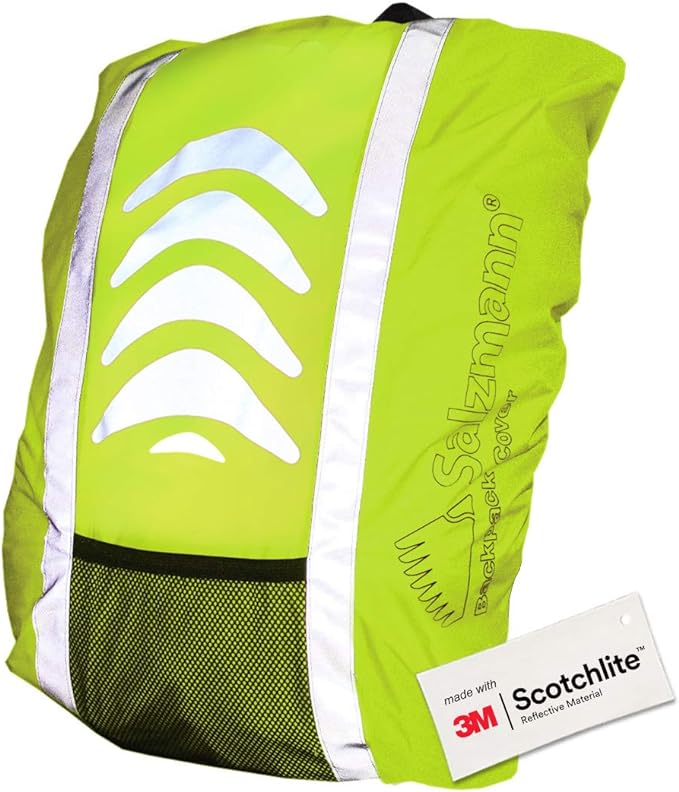
General Information & Running In
The Honda NX500 is supplied with a 2 year warranty with various options
to extend the warranty. Honda also offer an excellent and very
cost effective 3 year annual maintenance contract with the 1st service
at 600 miles. I purchased the 3 year annual maintenance contract for
£399.00 inclusive of vat.
Its a little strange but the running in period, when you have to keep
the engine revs low, is 300 miles but the 1st service is 600 miles.
13th March 2024 -
I have now completed the 300miles running in. It took 3 trips out and
each day the weather was very cold with rain, torrential in some areas, and blustery winds. When possible, I
kept the revs at around 4,000 to 5,000 throughout the gears to avoid
labouring the engine, which is just as bad as high revs
when running in. I have completed a chart below of my gear to speed to
4,000 revs ratios PLUS a second chart of best gears to match the speed
limits to best revs -
| 1st Gear | 17 mph | 4,000 Revs |
| 2nd Gear | 28 mph | 4,000 Revs |
| 3rd Gear | 34 mph | 4,000 Revs |
| 4th Gear | 42 mph | 4,000 Revs |
| 5th Gear | 48 mph | 4,000 Revs |
| 6th Gear | 50 mph | 4,000 Revs |
| Speed Limits | ||
| 2nd Gear | 20 mph | 3,000 Revs |
| 3rd Gear | 30 mph | 3,500 Revs |
| 4th Gear | 40 mph | 3,750 Revs |
| 5th Gear | 50 mph | 4,100 Revs |
| 6th Gear | 50 mph | 4,000 Revs |
| 6th Gear | 60 mph | 4,500 Revs |
| 6th Gear | 70 mph | 5,250 Revs |
I varied the type of roads. On the dual carriageway
I was forced to overtake slow traffic in the nearside lane and popped
the bike up to 70mph from 50mph in 6th gear at 5,250 revs in the outside
lane with relative ease. The country roads with their hills, corners and
straights proved excellent for bedding in the brakes, the gears and of
course the engine. The Honda NX500 has plenty of torque and the engine
braking is excellent.
Windscreen Buffeting (Optional
Tinted Windscreen)
I found that my (optional)
tinted windscreen produced a fair amount of head buffeting at 70mph on the
Edinburgh 'dual carriageway'
bypass, unless I
ducked down behind it - not cool on an adventure bike. With my long
back, I am looking over the top of the windscreen so I am guessing
that a shorter rider would not have the same problem? I may be
wrong, but I cannot see how the windscreen can be adjusted on the Honda
NX500.
My Triumph Speed Triple RS naked sports bike with its small windscreen
produces a different kind of buffeting, which is dispersed across the
torso rather than just the head. I guess the answer might be a smaller
windscreen on the NX500 or the other solution could be to heighten the
windscreen. Its
not a critical issue as I intend to be travelling at relatively slower
speeds on narrow country trails, during my country rambles.
May 2024 - Now, having ridden the NX500 for over 900 miles, I have
become used to the buffeting. I now find it is only a minor nuisance
when travelling at higher speeds and it does not impact on my handling
of the bike.
13th June 2024 - I have removed the tinted windscreen and replaced it
with the original Honda clear screen. I found that on overcast days,
especially when it was raining, the tinted windscreen became very dark
and difficult to see through. This was a particular problem for
navigating deep potholes and for avoiding large stones on the single
track roads of the Scottish Borders. Both screens are the same size and
fitting, so the clear windscreen produced the same amount of buffeting
on my head when travelling at speed.
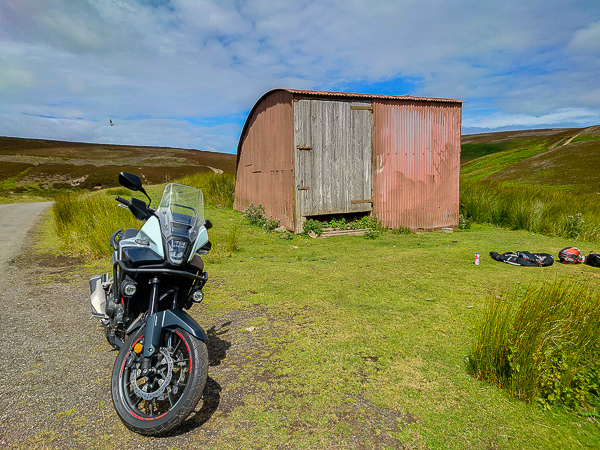
Cleaning the Honda NX500 Motorcycle
I guess all adventure motorcycles may have
the same issue. Muck thrown up from the back of the bike in bad weather.
The Honda NX500 is not too bad as the muck only reaches the lower parts
of my legs and the base of my
backpack and not up my back. Without the back pack, the muck would land
on my rear end.
The front mudguard is short at the rear and a great deal of muck ends up
on the radiator, the pipes and the nooks and crannies at the front of
the engine. Not a great problem but I spend a lot of my time extensively
cleaning those areas when washing the bike. You have to be careful when
cleaning, not to damage the radiator fins. I fitted a radiator guard
from GIVI which makes a huge difference by offering protection from
stones and also makes cleaning a lot easier. See
Radiator Guard.
September 2025 Update: I have fitted a
Pyramid Front Fender Extender
to the front mudguard and it has proven its worth by keeping the main
muck off the pipes and the front of the engine.
I am used to cleaning my
sports motorcycles with very little trouble as they don't get that dirty
on dry roads. The Honda NX500 is for use in all weathers. During the first
trip of 101
miles and the two subsequent trips, I was riding in heavy rain, buffeting wind and riding over muck from
tractors on country roads. The bike was covered in dirt, including the
chain.
Suddenly, I was confronted with the nightmare - how do I clean it all
off, especially getting into those nooks and crannies without using a
power hose (not recommended) and even worse, I would have to clean the bike more often as I
intended to use it during inclement weather, on country trails and
especially during the winter period. I did my research on YouTube and having trawled through myriads of
'how to clean your motorcycle advice' I opted for the Muc-Off solution.
I have tended to use
ACF-50
to protect the bike but
Muc-Off Motorcycle Protectant
is far easier to apply, there is less mess and there is much less sticky
muck after a trip, and the muck is easier to wash off. It lasts long and
the rain beads off the bikes components.
-
Muc-Off Essentials (Sponge/Brush/Cleaner/Motorcycle Protectant)
A video on using Muc-Off but I prefer to first clean the entire bike including the chain and sprockets and then finish cleaning the chain using the chain cleaner with the brush, dry the chain off and finally apply the chain lubricant -
Scottoiler X - Chain Lubrication System
I have a Scottoiler X System fitted to my Honda NX500 which will automatically apply
a drip of oil on my chain when the bike is running on the road.
However, after a day out on the country trails of Scotland and cleaning the crud
of my NX500 using Muc-Off cleaner, I will clean the chain, using Muc-Off
chain cleaner, dry the chain off and apply some Muc-Off chain
lubrication. I feel the Muc-Off chain lubrication is important as I also
ride my sports bikes and the Honda NX500 might be sitting in the garage
for a few days/weeks with a dry chain that may start to show signs of rust.
An image of my Scottoiler X followed by a video of how it works -

I have included a
Maintenance Checklist. I always check my bike using this list - prior to heading out on a trip.Checking the Coolant Level
According to the Honda user
manual, the Honda NX500 coolant level should be (with the engine cold) between the maximum and
minimum marks on the white plastic reserve expansion tank when the bike
is standing upright on two wheels. Any coolant top ups
(not the front radiator -
do not remove the radiator cap)
must be accomplished by filling the white plastic reserve expansion tank
from the white plastic down pipe with its small black cap on the
centre/left of the bike. When the engine and the coolant are cold, remove the pipe's black cap and the manual
advises that you top up to the maximum level and NOT above it.
The white plastic reserve expansion tank is situated under the bike and
is best viewed from the left side by lying under the bike and peering in
at the back of the left foot peg above the top of the chain to read the
marks. Of course to achieve the correct reading the bike must be
standing on two wheels in an upright position. The recommended coolant is
Honda Pro HP Coolant to top up the reserve
expansion tank as it contains the proper inhibitors to prevent rust and
sludge building up in the coolant system.
GIVI Radiator Guard
In the short time I have ridden the bike in mucky bad weather,
the radiator gets a
lot of muck thrown up on it and I guess it won't be long before it gets
a stone ding as the front mudguard does not cover the whole of the rear
of the front wheel and is quite short. I have decided to fit a radiator guard and one will soon
be available from
R&G Motorcycle Parts. It is easy to
fit with the supplied 4 rubber grommets to keep it away the front of the
radiator and to prevent vibration/noise. It is secured with 4 cable
ties, also supplied.
In any event, I decided to purchase a bolt on one, which I ordered from
Branded Bikes in the UK. Its a
GIVI PR1171 Radiator Guard which is
fitted using the supplied bolts in the pack. The two top stock bolts are
replaced by the two GIVI kit bolts and kit washers/spacers whilst the
two bottom stock bolts are re-used. I found that, looking from the
front, the top left kit bolt with its spacers was the hardest to fit, so
I secured it first and left it slightly loose before fitting the other
three bolts.
Image of the GIVI radiator guard fitted to my bike and
Fitting Instructions -
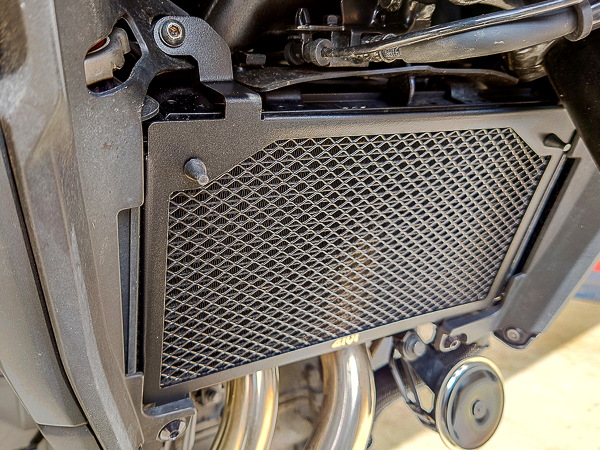
The engine oil level can be seen through a small round window situated near the bottom of the engine on the right side of the bike. If the engine is cold, start it and run it until it is warm. Switch off the engine and stand the bike on two wheels in an upright position and let the oil settle (a couple of minutes) before checking the window. The oil level should be across the middle of the window. The user manual recommends that if the level is on or below the lower level, a top up is required. You remove the oil filler cap on the right side of the bike and with the bike still on two wheels and upright, you top up to the maximum level in the window (NOT above Max) The recommended oil is Honda SAE API Service 10W-30 motorcycle engine oil which meets specification API SH (or higher) and JASO 903 Standard MA. WARNING: Do not use energy conserving or resource conserving oils.
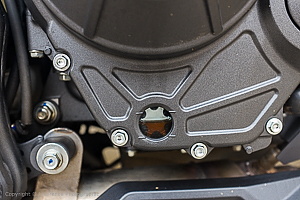
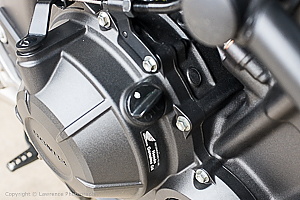
The Honda NX500 has the following lights 'permanently on' -
-
Dipped Front Light
-
Front Indicators on Low (High Blinking when Indicating)
-
Rear Light
-
Two Front Spot Lights (Optional Extra - Permanently Switched On)
NOTE:
With
harsh braking, both rear indicators commence blinking - similar to
when the indicator hazard warning switch is pressed. They return to
their 'off' setting when the harsh braking stops.
The controls are all as expected with the exception of the flasher/main
beam switch. The kill switch, hazard warning switch and starter switch
are all on the control cluster on the right of the handle bars - shown
in first image below -
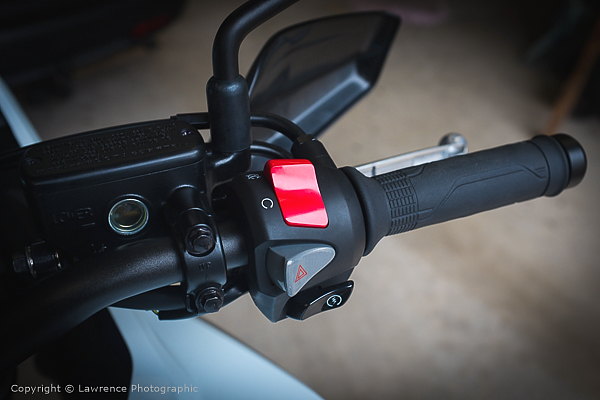
The far left of the image below shows the Honda heated grips switch
which flashes a set number of green blips depending on the press
setting. After the setting is selected the blips become a steady green.
When the bike ignition is switched off, the heated grips are switched
off and remain off when the bike is re-started.
The next top switch to the right is the traction control toggle switch.
The bike must be stopped with the engine running to toggle the traction
control off/on. When set to off, there is a light showing on the TFT display.
In any case, when the bike ignition is switched off, the traction control reverts to
on. NOTE: When starting the bike the traction control light will
be on but it goes off when the bike moves off (unless I switch the
traction control off using the toggle switch)
The next top switch to the right with the white centre is the TFT Screen
set-up toggle switch. More of this in the TFT Screen section.
Below is the horn switch and below that is the indicator switch which
when used (right or left) displays well spaced right and left green
lights on the TFT Screen. The indicators are not self cancelling.
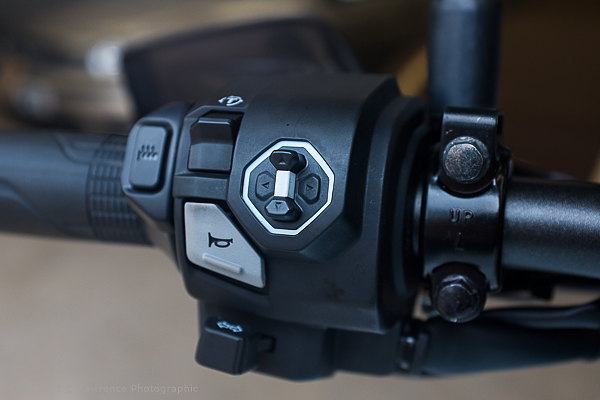
There is the flasher/main beam hook style switch at the back of the left
hand side handlebar controls as shown in the image below. It is flicked
forward to put on the main beam and flicked back to put the main beam
off. If flicked completely back it also flashes the front main beam
light. Personally, it does look and feel very flimsy and I guess time
will tell if it holds up okay.
Having used it many times in the last few months, this switch does the
job and is holding up very well.
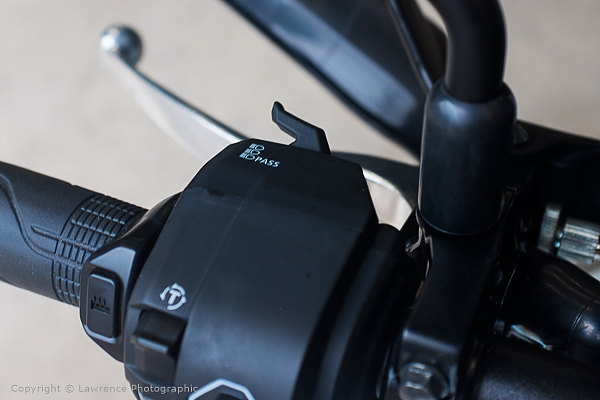
Finally, there is the option, which I had fitted, of spotlights fitted
to a crash protection bar with a press on/press off switch on the
dashboard and also a 12V Socket on the dashboard - both shown on the
left side of the image below -
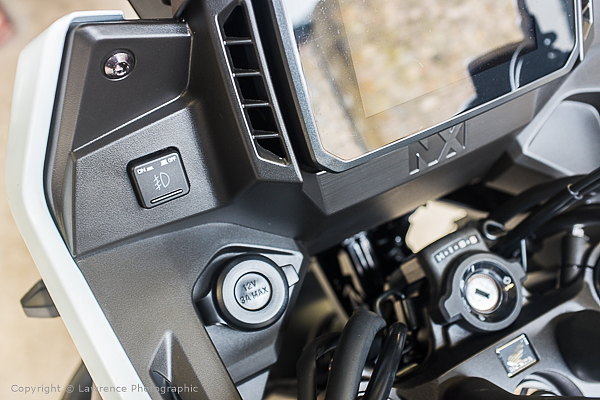
TFT Screen & Toggle Switch Control
I have the TFT Screen setup as shown in the images below. It is fairly
simple to use the toggle switch on the left side of the handle bars to
set it up. (See toggle switch with white centre in the first image
below)
Toggle up and down to change the bottom 'Information Bar' for various
displays (I have the bike's - Total 101 mile - showing).
Toggle to the right to jump to the 'Selectable Screen' and then toggle
up and down to select a display
(I have the Trip A and the 0 to 100 mile/gal showing).

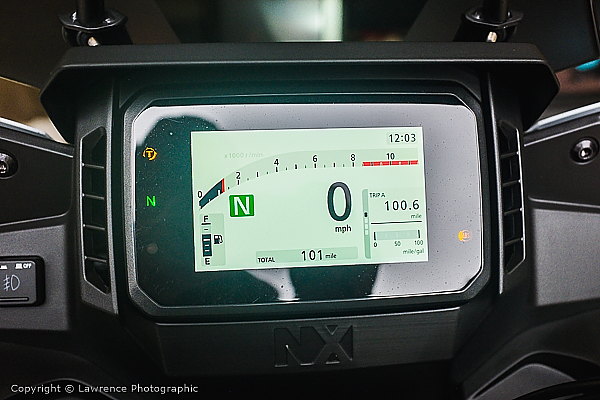
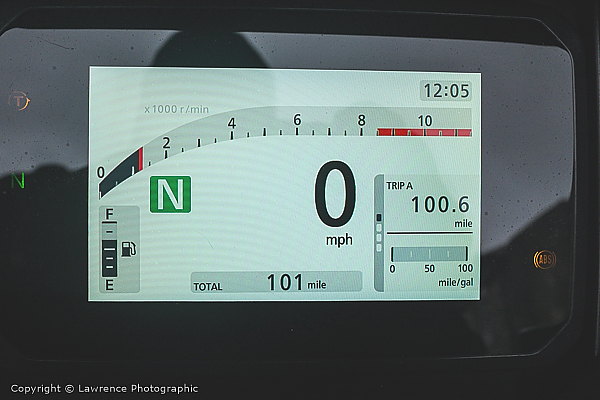
You can also enter the main Settings Menu by toggling right onto the 'Selectable
Screen' as shown on the right in the first image below, then toggle down
to the gear icon display in the 2nd image, then toggle right to get into
the main menu settings in the 3rd image. Then, using the toggle switch (right,
left, up
and down) to follow the menu direction indications.
NOTE: My TFT Screen background is set for Auto - these images
were shot in my garage with very little light - the screen displayed a
black background.
Selectable Screen on the Right
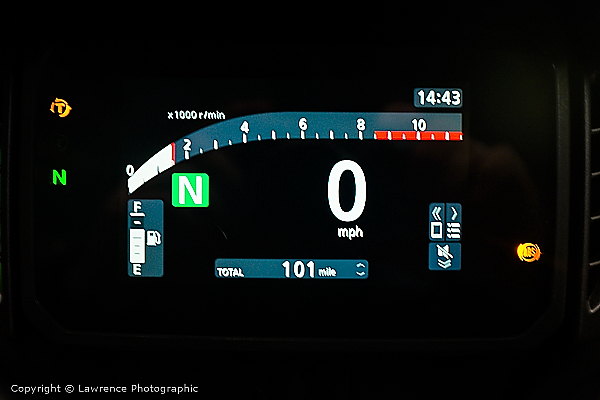
Gear Icon Screen on the Right
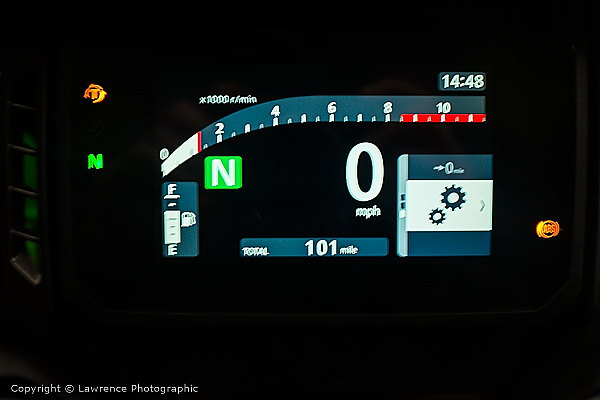
Menu Settings
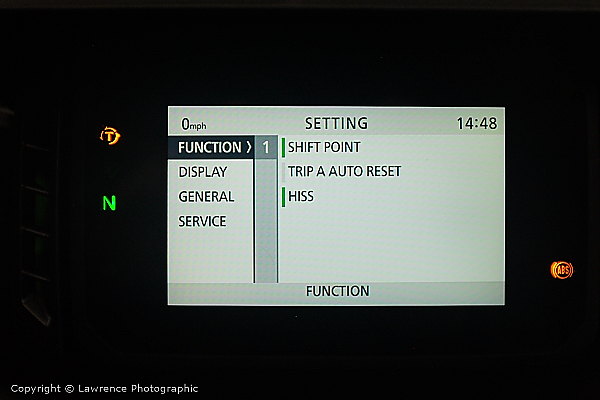
I don't plan to ride the Honda NX500 like my sports bikes - I purchased
the bike for a more sedate form of riding on country B roads and narrow
trails. I decided to change the point at which the revolutions of the
engine triggered the tachometer to flash a light on the TFT Screen.
Once you reach the Setting Menu (1st image below - using the above
TFT
Screen & Toggle Switch Control method) you use the toggle
switch to move right onto the Shift Point (2nd image below) and then
move right onto the Shift Point Setting (3rd image below) and then move
right onto setting the tachometer shift point (4th image below).
Using the toggle switch move up or down which will set the tachometer
shift point of your choice - I set mine for 8,000 engine revolutions.
Once you have a number you like - toggle to the left, all the way out of
the menus, to the main TFT Screen.
1st Image - Setting Menu

2nd Image - Shift Point
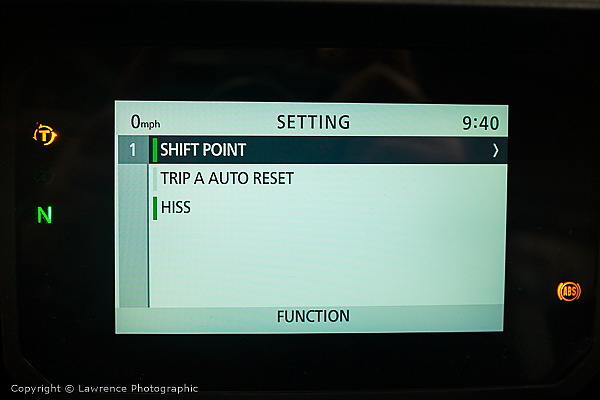
3rd Image - Shift Point Setting
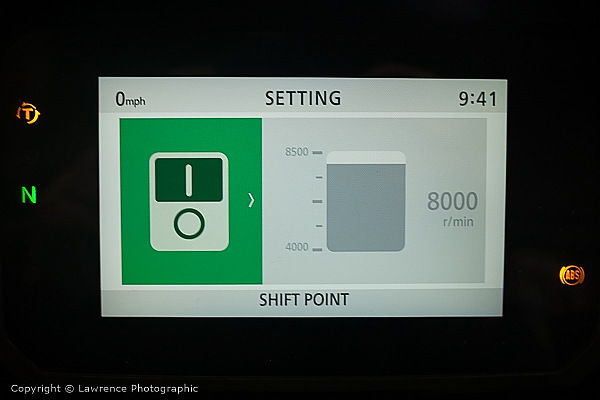
4th Image - Setting the Tachometer Shift Point
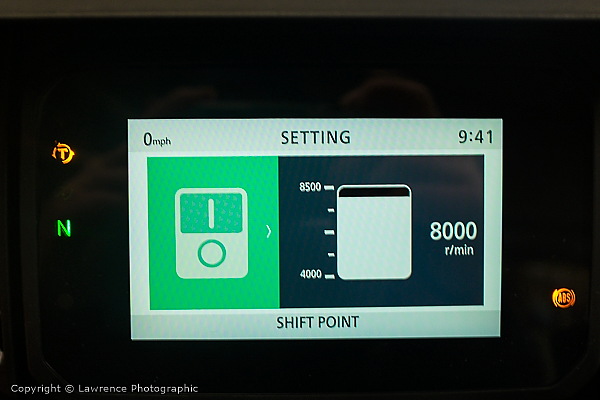
I
found the seat
offered a comfortable sitting position. I have a 32" inside
leg and wearing my heavy Gore-Tex textile trousers, I was able to flat
foot my boots on the road with ease. It is not a wide seat and there is
no pain on my thighs with both my boots on the roadway. There are times
when you have to 'duck walk' the bike into a parking space, which I
could easily accomplish. When standing at traffic lights or at any other obstacle on the
road, there was no problem putting my left foot down on the road and
keeping my right foot down on the foot brake.
I found that after around 80 miles non stop travelling, I started to get
numb bum and I had to take a break. So, in my case and being a 75 year
old man, touring for any long distances (non-stop) could prove a problem
on the stock seat. Of course, this might not apply to everyone,
especially younger guys. There is a solution, and that is to retrofit an
air cushion on top of the stock seat. Amazon supply loads of options
including the
Premium Grand Pitstop as shown
below.
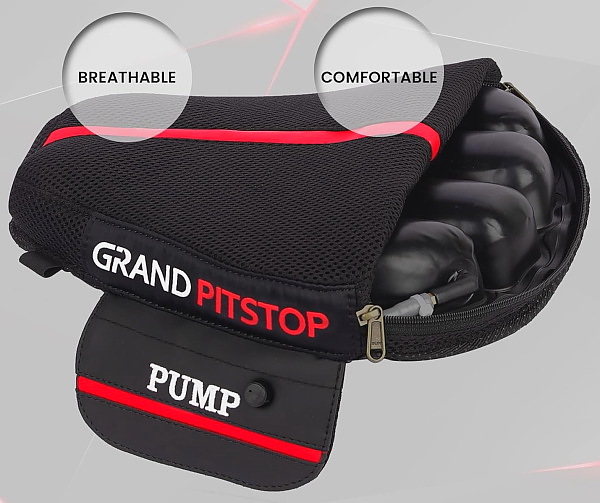
You can remove the seat by inserting the ignition key in the left side,
just under the seat, and turning the key, you hear a click and the seat
pops up at the rear. There is a toolkit secured under the seat at the
back with the bike's battery at the front. See image below -
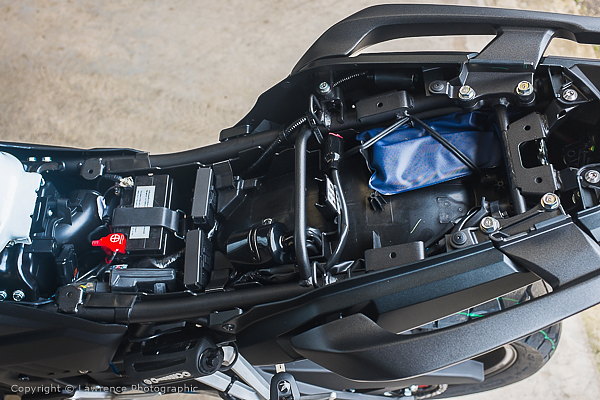
When the side stand is down and with the bike in neutral gear, you do
not have to pull in the clutch lever when starting. However, the bike
will not start if the side stand is down with a gear selected.
When stopping the bike and planning to put down the side stand, you have to be a bit of a contortionist to get your
left boot behind the left foot peg, either using the heel or
bending your foot around to get your toe on the stand to press it
down. I ended up using my heel, but with difficulty. The
problem for me is that the side stand pin is more to the rear of the
bike in comparison to the left foot peg, so I have to turn much more to
my left and look down to see where the side stand pin is.
I found that in torrential rain, I had to open up my visor to see where
the side stand pin was rather than just instinctively putting my foot
down on it.
This is
different to my sports bikes where the side stand pin is further forward
and I can just
put my foot straight down without looking and push the side stand down.
If the NX500 was my only motorcycle, I would become more accustomed to
the position of the side stand.
Fortunately, standing at the left side of the bike, my (optional) centre
stand is a breeze to put my right foot down on and with relative ease,
haul the bike backwards and up onto the centre stand.

My Bike on the Centre Stand
The gearbox is slick, no heavy clunking, more of a click between the
gears and no false neutrals. It does not require a quick shifter and if
you want, you can easily shift up the box using the throttle and your
left foot, without using the clutch. Having stated that, using the
clutch at any speed to shift up and down the gears is effortless. I tend
to shift gears in the mid rev 'sweet spot' with plenty of torque and I
am very rarely above 6,000 rpm.
The Mirrors
The mirrors are excellent with very slight vibration at 5,500 revs
and above which does not impact on the view behind.
Properly adjusted, there is a clear view behind on both sides with only
a tiny bit of the jacket sleeve showing.
Brakes
The brakes are gradually bedding in and I suspect they will get even
better. Using both brakes, the emergency stopping distance at 60mph and
70mph is
superb and the confidence the brakes deliver is excellent, even in
torrential rain.
The rear brake (at first) was non existent but it has greatly improved
after 300 miles, but on its own, it still requires a very firm press of
the brake pedal to have any major impact on stopping the bike. For slow
manoeuvres,
I use a gently
throttle, clutch and the rear brake, which is more than adequate -
they work very well.
The front brake has real bite and stopping power. It does not disappoint
and when combined with the rear brake it instills a feeling of safety
when riding in fast traffic on the outside lane of a dual carriageway.
You can see examples of 60mph and 70mph braking in my video review at
the foot of this page.
Slow Speed Manoeuvres
The Honda NX500 is a dream bike for slow speed handling providing I make
gentle throttle adjustments when in 1st gear as the bike offers up harsh
engine braking during deceleration. However, I had no difficulty in
completing
clutch/throttle/back brake 'ultra slow' manoeuvres. The turning circle
is excellent.
On
the Road
My first 300 miles (3 x 100mile+ trips) on the Honda NX500 were
conducted in penetrating drizzle, very high winds and very often
torrential rain. In combination, on the country roads, I had tractor
muck to contend with. The motorcycle produced superb tyre grip in the
wet on the corners, and I found myself leaning it over much more than I
would on my sports bikes.
The bike is extremely flickable on the corners, lightweight to handle
when riding on the country roads, and yet heavy enough to remain stable at
higher speeds on the dual carriageways. I guess with all my accessories,
the Honda probably now weighs in at around 200kg wet. The high winds
buffeted my helmet at higher speeds but at 70mph on the soaking wet dual
carriageway the bike remained planted and did not produce any sudden
shifts as the side winds struck it. I had no problem overtaking slower
vehicles in the inside lane and easily accelerated from 50mph to 70mph -
very often using 6th gear. The engine on the Honda NX500 is the same one
as on the earlier model, the Honda CB500X which I tested on a private
road and I achieved 95mph without any difficulty and with poke to spare.
I have never switched the traction control off, I prefer to leave it
working. You can switch it off when the bike is stopped and the engine running. You
flick the toggle switch and a light appears on the left/top of the TFT
Screen. If you switch the ignition off and back on - the traction
control is reset automatically to ON and there is no light on the TFT
Screen. NOTE: The TC light is on when you start the bike but it
goes off once you move off. Despite riding in torrential rain and accelerating out
of country road corners, I have never felt the traction control come on
or indeed the light on the TFT Screen flicker to indicate the traction
control was working. I guess the tyre grip and the suspension are just
very good.
The torque is excellent and I use 1st gear to get up to a reasonable
speed and then up through the gears, shifting at
around 4,000revs to 6,000revs which seems to maintain the peak torque.
The gearbox is excellent and produces little clicks when shifting up and
down the box at all speeds - I did not experience any clunking when
changing up/down the gears. On the odd occasion, when coming to a
complete stop (unless you blip the
engine and drop the gear beforehand) shifting down from 2nd to 1st gear
when stopped at a stop sign will often produce
the usual clunk that most motorbikes suffer from.
The brakes are gradually bedding in and I suspect they will get even
better. Using both brakes, the emergency stopping distance (I tested the
brakes together at 60mph) is superb and the confidence the brakes
deliver on a soaking wet dual carriageway is excellent.
The suspension and handling of the Honda NX500 are excellent. I threw it around a few
country road
corners, up and over some serious rises and falls in the roadway and the
tyres remained planted on the tarmac, even in the soaking wet rain.
Crazy stuff on those corners with an eye open for tractor muck but great
fun. I never thought that I could have so much fun riding a bike in bad
weather.
I don't do much urban riding in Edinburgh City, probably the only time
is when I take my bikes in for servicing at the dealerships. However,
when those occasions occur and much more often when I am lane splitting
between stationary traffic on the dual carriageway, I like to keep the
revs of the bike relatively high to avoid stalling, especially when I am
suddenly forced to reduce my 20mph lane splitting speed. When lane
splitting and continually moving forward, I tend to remain in 2nd gear
and only dropping to 1st when the speed is likely to drop because of
slower manoeuvres (even duck walking) between tight stationary traffic.
I never use the front brake when lane splitting except in an extreme
emergency - I prefer to feather the clutch and gently use the throttle
in combination with the rear brake.
The Honda NX500 motorcycle could be classed as an 'all rounder'. It has
enough poke to have some serious sports fun on the corners, enough power
for safely touring, especially overtaking and staying ahead of the herd
on dual carriageways and the perfect adventure bike for traversing those
single track roads high up on the hills. I baled out on the cow tracks
as I did not have enough experience to keep the bike moving over soaking
wet grass, mud and water filled holes.
I have put together a table showing my preferred engine revs in relation
to the road speed limits and gears -
| Speed Limits | ||
| 2nd Gear | 20 mph | 3,000 Revs |
| 3rd Gear | 30 mph | 3,500 Revs |
| 4th Gear | 40 mph | 3,750 Revs |
| 5th Gear | 50 mph | 4,100 Revs |
| 6th Gear | 50 mph | 4,000 Revs |
| 6th Gear | 60 mph | 4,500 Revs |
| 6th Gear | 70 mph | 5,250 Revs |
On Country Trails
Having taken the Honda NX500 on a green/muddy cattle track up on the
hills, the bike performed okay - better than me. I have absolutely no
experience riding off-road, so to say I was apprehensive is an
understatement. I had both feet hovering above the ground and even with
the traction control on (perhaps a mistake) the rear wheel was sliding
about left and right behind me. I am sure that 2nd gear would have
proved a lot better than 1st but I was not skillful enough to control
the bike at a faster pace and as for standing up on the pegs - well that
was not going to happen.
After about 50 yards, I decided that my riding skills on cattle tracks
were useless and if I continued I would end up on the ground, face in
the mud.
After my Honda had received its 600 mile service, I decided to take it
out for a country ramble up in the hills of Duns and on some proper
off-road trails. The following video, finally made up my mind that at my
age, off-road riding was not for me. I was very fortunate that my tyres
were not damaged on those rocks and that I did not crash and damage my
new bike. In any case, having searched the internet for designated
off-road motorbike trails up in the hills of Duns in the Scottish
Borders of Scotland, I came up short. The last thing I want is to fall
foul of a farmer who resents me riding on his land.
However, riding the bike on those narrow 'single traffic' roads on the
hills, overlooking Duns and the Scottish Borders proved to be very
enjoyable. This was one of the reasons for
purchasing the Honda NX500 and it is working out very well.
Stock Exhaust Note
The exhaust note is
surprisingly throaty. Its very pleasant to hear as I shift up through
the gears. I suspect it can only get better as the bike puts on more
miles. You can hear the exhaust note in my video review at the foot of
this page.
Luggage
I did plan to add luggage and there were various choices. Honda offered
their own branded kit which included two hard cases that clip onto pannier
side racks which
I thought were excellent. However, there is a catch, a rear carrier must
also be fitted to complete the fitting of the side panniers. This bumps
up the price considerably. Then there was the SW-Motech Blaze Pro
Saddlebags thrown over the rear seat, with (simple) clip-off bag support
rods fitted to the rear foot pegs, which I figured were simple to use.
However, I use a small backpack when on my sports bikes which can easily
accommodate all the stuff I want to carry and it is not too heavy on my
back. So, I figured, I would use the same set-up when riding the Honda
NX500.
I use a large Kriega R35 backpack and a Kriega Drypack fitted to the
rear of my Suzuki GSX-1250FA Sports/Tourer when I head out for a
week-end break, so I figured I could use the same set-up if I ever used
the NX500 for a week-end away.
Negatives
So far after riding the Honda NX500 for 1,200 miles, I have found a
few negatives (not deal breakers)
-
-
The side stand pin is set further back towards the rear wheel in relation to the left foot peg. More at Side Stand & Centre Stand.
-
Checking the water coolant is not very easy and probably will require a second pair of hands to help out. More at Checking the Coolant Level
-
Heavy buffeting against my head at higher speeds on the dual carriageways. See Windscreen Buffeting
-
The front mudguard is short at the rear and a great deal of muck ends up on the radiator, the pipes and the nooks and crannies at the front of the engine. Not a great problem but I spend a lot of my time extensively cleaning those areas when washing the bike. See Cleaning the Honda NX500 Motorcycle.
September 2025 - I have installed a Pyramid Front Fender Extender to stop the muck hitting the pipes. It was easy to install, I released all the front mudguard fixings and raised the mudguard to stick the extension on underneath, using the supplied adhesive fixings. I did not want to remove the front wheel to remove the mudguard. I did not require to use the 4 plastic rivets as I did not want to drill holes in the mudguard.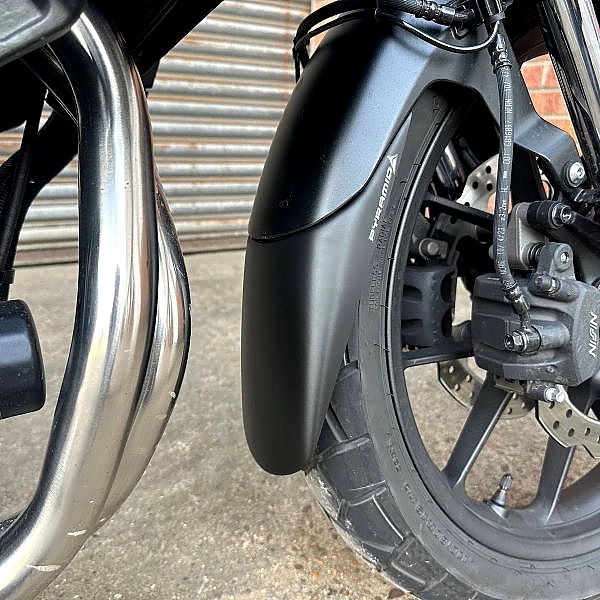
A seating 'numb bum' problem arises at around 80 miles non-stop travelling. However, there is a solution for those who wish to use the NX500 for touring - See Seating.
1st 600 Mile Service
Having done 600 miles on the NX500 6 weeks ago, I did not want to go
over the recommended 1st service limit, so I left her in my garage and
used my other bikes. Today, 7th May 2024, I took her down to the
Edinburgh Honda Dealership who did a fine job of servicing her. I was
well pleased, especially as I was set to enjoy the year ahead with her
before she required her next service.
There must be some spiritual connection with a motorbike, after all as
men, we tend to call them 'she' or 'her' but then women usually call
their motorbikes by a male name.
In any case, after her 600 mile service, I enjoyed my first ride on
her down the coast through East Lothian.
_____________________
This
is an unprofessional video review about my Honda NX500 Adventure Motorcycle. It covers
my experience of riding the bike on various types of road in Scotland
and a couple of emergency brake tests at 70mph and 60mph.
At the very end of the video, I voice
my conclusions about my bike.
The video was made using an in-expensive Crosstour CT9900 4K Action
Camera and produced using an old version of Power Director Software
which only renders in HD and not 4K.
Important: As this video is embedded - for subtitle (extra)
information - please click on the video Subtitles/Captions Icon
which will then show a
_____________________
The second service in March at Honda, Edinburgh went without a hitch.
My Honda NX500 served me well over the winter period and was a joy to ride in all weathers. This September, I upgraded the front mudguard with an extender to stop the muck hitting the pipes and the front of the engine.It was easy to install, I released all the front mudguard fixings and raised the mudguard to stick the extension on underneath, using the supplied adhesive fixings. I did not want to remove the front wheel to remove the mudguard. I did not require to use the 4 plastic rivets as I did not want to drill holes in the mudguard.

